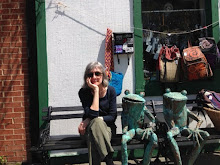According to Jewish mystical tradition, each of us is born with a unique purpose. There is soul work, an inner transformation, that only we can do. We each have to walk our own path to do this soul work – you can’t walk my path, nor can I walk yours.
Within this perspective, obstacles that we encounter on the path of life may be understood as opportunities for personal development and transformation. How you deal with difficulties is part of what makes you who you are. (The tradition goes even further, suggesting that obstacles are gifts, always meant for your benefit – but I find the notion of “opportunities” less theologically problematic than “gifts.”)
The tradition also suggests that each person is born with unique soul characteristics, a unique combination of attributes and temperament. This too is related to the transformative work we need to do. For example, a person may need to transform the relative weight of anger and patience they were born with.
In this week’s Torah reading in the book of Genesis, God tells Avram “Go forth from your land, from your birthplace, from your father’s house, to the land that I will show you.” The Hebrew for “go” in the text is lech lecha, a double verb form that makes an imperative emphatic. If lech means go, then lech lecha means GO! And that is how the verse is commonly understood.
Through our psychospiritual lens, the verse can be understood differently – because the Hebrew letters in lecha also have the meaning of “to you” or “for you.” So we can read the beginning of the verse in this way: “Go towards yourself.” In other words, go forward on the path of inner transformation and soul work that you are meant to do in this lifetime.
And why the seemingly redundant mention of “your land,” “your birthplace,” “your father’s house”? Wouldn’t any one of those be sufficient to convey the message to Avram that it is time to leave town?
Symbolically, we can understand these three terms as referring to the surrounding culture (your land), the everyday environment (your birthplace), and the family (your father’s house). We will ultimately have to move away from the negative influences in each of these three circles if we want to grow.
Can you see the practical implications in your own life? Perhaps in your family there has been a multi-generational pattern of harsh criticism, or of self-effacement. Your soul work may be to become conscious of that pattern and cultivate more positive qualities, giving your child a different role model. Or we might say that the surrounding culture is too violent, and so your soul work might involve strengthening the counter-cultural tendency of gentleness in your personality.
God’s instruction to Avram (who went on to become Abraham the patriarch of the Jewish people) is an instruction for us as well. We all need to get moving! It is our destiny to move forward on the path of inner transformation. What will be your next step on the path?
[source text: Netivot Shalom al ha-Torah]
Within this perspective, obstacles that we encounter on the path of life may be understood as opportunities for personal development and transformation. How you deal with difficulties is part of what makes you who you are. (The tradition goes even further, suggesting that obstacles are gifts, always meant for your benefit – but I find the notion of “opportunities” less theologically problematic than “gifts.”)
The tradition also suggests that each person is born with unique soul characteristics, a unique combination of attributes and temperament. This too is related to the transformative work we need to do. For example, a person may need to transform the relative weight of anger and patience they were born with.
In this week’s Torah reading in the book of Genesis, God tells Avram “Go forth from your land, from your birthplace, from your father’s house, to the land that I will show you.” The Hebrew for “go” in the text is lech lecha, a double verb form that makes an imperative emphatic. If lech means go, then lech lecha means GO! And that is how the verse is commonly understood.
Through our psychospiritual lens, the verse can be understood differently – because the Hebrew letters in lecha also have the meaning of “to you” or “for you.” So we can read the beginning of the verse in this way: “Go towards yourself.” In other words, go forward on the path of inner transformation and soul work that you are meant to do in this lifetime.
And why the seemingly redundant mention of “your land,” “your birthplace,” “your father’s house”? Wouldn’t any one of those be sufficient to convey the message to Avram that it is time to leave town?
Symbolically, we can understand these three terms as referring to the surrounding culture (your land), the everyday environment (your birthplace), and the family (your father’s house). We will ultimately have to move away from the negative influences in each of these three circles if we want to grow.
Can you see the practical implications in your own life? Perhaps in your family there has been a multi-generational pattern of harsh criticism, or of self-effacement. Your soul work may be to become conscious of that pattern and cultivate more positive qualities, giving your child a different role model. Or we might say that the surrounding culture is too violent, and so your soul work might involve strengthening the counter-cultural tendency of gentleness in your personality.
God’s instruction to Avram (who went on to become Abraham the patriarch of the Jewish people) is an instruction for us as well. We all need to get moving! It is our destiny to move forward on the path of inner transformation. What will be your next step on the path?
[source text: Netivot Shalom al ha-Torah]
